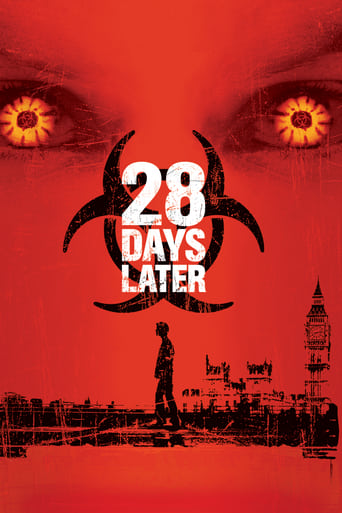The days are numbered.
"28 Days Later," a groundbreaking British film produced by DNA Films in 2002, redefined the zombie genre with its fresh take on the apocalypse. Directed by Danny Boyle and written by Alex Garland, the movie follows bicycle courier Jim, played by Cillian Murphy, as he awakens from a coma to find London deserted and overrun by rage-infected humans. The film's use of digital video cameras lent it a raw, documentary-like feel that heightened the sense of realism and urgency, setting it apart from traditional horror films. Its innovative approach to the zombie narrative, featuring fast-moving infected rather than the slow, lumbering undead, injected new life into a genre that had grown stale. The film's narrative delves into themes of survival, human nature, and societal collapse. As Jim navigates the desolate streets of London, he encounters other survivors, including Selena (Naomie Harris) and Frank (Brendan Gleeson), who are struggling to stay alive amidst the chaos. The characters' interactions reveal the fragility of human morality when faced with extreme circumstances, as they grapple with trust, betrayal, and the instinct to protect one another. The film's pacing is relentless, mirroring the frenetic energy of the infected, and keeps viewers on the edge of their seats from start to finish. "28 Days Later" also stands out for its hauntingly beautiful cinematography, which captures the eerie emptiness of a post-apocalyptic world. Iconic scenes, such as Jim's walk across a deserted Westminster Bridge, juxtapose the familiar landmarks of London with the desolation of a world turned upside down. The film's score, composed by John Murphy, adds to the tension with its minimalist yet powerful soundscapes, particularly the now-iconic "In the House - In a Heartbeat" track that plays during the climactic moments. These elements combine to create a visceral and immersive experience that lingers long after the credits roll. Ultimately, "28 Days Later" is more than just a horror film; it is a poignant exploration of humanity's resilience and fragility. Its impact on the genre is undeniable, inspiring a wave of similar films and cementing its place in cinematic history. The movie's success lies not only in its thrilling plot and innovative filmmaking techniques but also in its ability to provoke thought and evoke emotion, making it a timeless piece of British cinema.
Year2002
Homepage
Budget8000000$
Runtime113 min
Revenue85032676$
GenresHorrorThrillerScience Fiction
Production countriesUnited Kingdom

